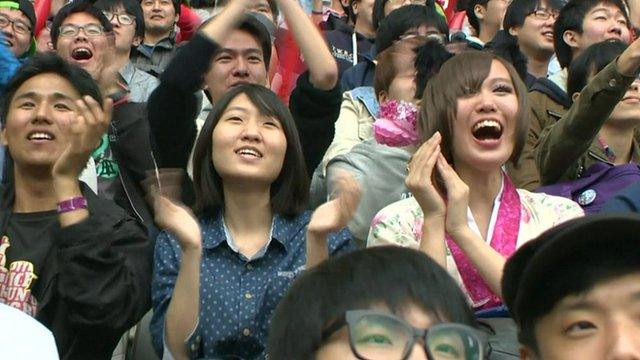South Korea gaming: How a T-shirt cost an actress her job
- Published
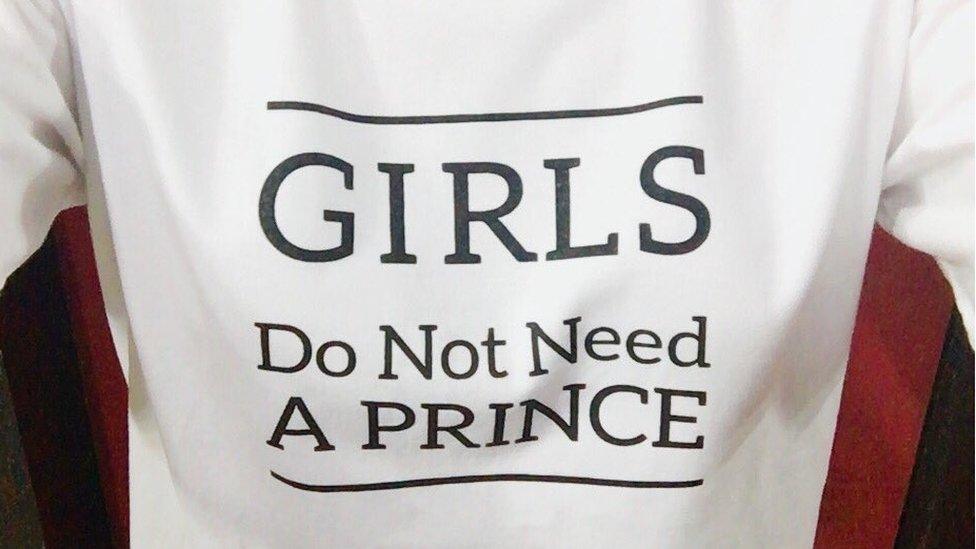
Kim Jayeon could not have expected that a tweet would have cost her her job
The "Gamergate" controversy which roiled the world of video gaming has hit a new level. The name was coined as a row over whether Western gamers were mostly male and anti-women. Now, a similar row is rocking South Korea, arguably the country with the strongest culture of gaming in the world. As the BBC's Steve Evans reports from Seoul, it all started with a slogan on a T-shirt.
On the face of it, the slogan "Girls do not need a prince" doesn't seem that controversial.
In many parts of the world, it would pass as the kind of thing any young woman might wear without prompting a second look.
But when the actress, Kim Jayeon, tweeted a photograph of herself wearing the garment, she generated a storm and lost herself a job.
She was the voice of one of the characters in a South Korean online game called "Closers". Gaming is very big in South Korea, as much a part of the culture as football.
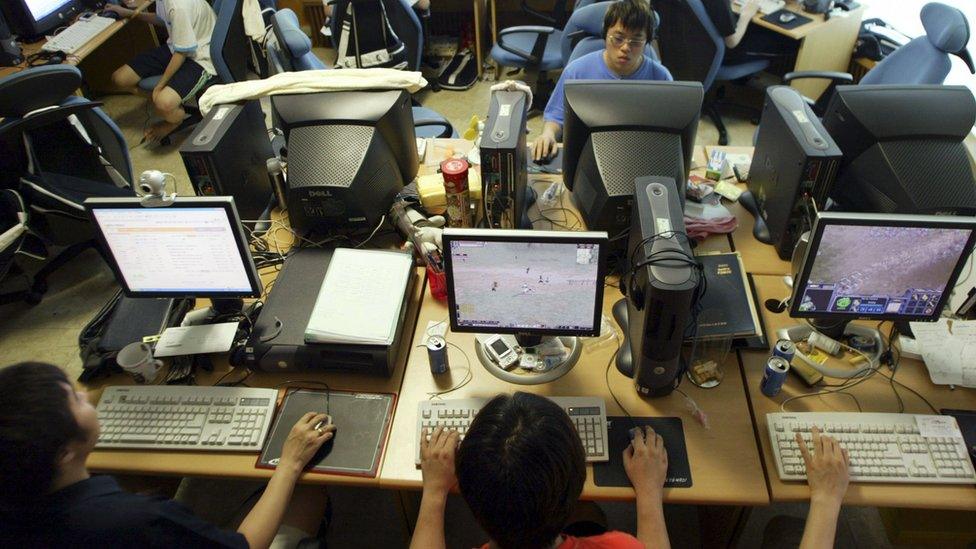
The gaming industry is predominantly male-dominated in South Korea
Fans of "Closers" inundated Nexon, the company which produced the game, with complaints. Many of the complaints, according to female activists, were offensive and anti-women.
Nexon quickly bowed to the protesters and sacked the actress. It told the BBC that she would be paid in full for her work but her voice would not be used on the game.
It issued a statement saying it had "recognised the voices of concern amongst the Closers community", adding that "we have suddenly decided to seek a replacement in the role".
The company later told the BBC it had decided not to use the actress's voice because it didn't approve of the T-shirt and why it was being sold.

Closers is a MMORPG developed by Naddic Games and published by Nexon in Korea
Man-hating?
The problem was that the slogan is associated with a feminist group in South Korea called Megalia, which campaigns against the misogyny which its (usually anonymous) members say pervades Korean life.
The T-shirt was being sold by Megalia to finance lawsuits brought by women against men they alleged had ill-treated them.
There's no doubt Megalia is controversial and confrontational. Its logo includes an image of a hand with a first finger and thumb close together - the common sign for smallness.

Megalia argues that Korean women need respect and equality
The logo is taken by some men and Megalians as a derogatory and deliberately provocative reference to the size of Korean penises.
Many men do not like Megalia. Some retaliate with online abuse - with "bitches" being one of the mildest words used.
It was in this toxic atmosphere that the actress tweeted the T-shirt. with its slogan "Girls do not need a prince".
She is not giving interviews and it's not known if she wore the shirt in the tweet without being aware of the context.
'Pigs'
Megalians say the slogan was meant to decry a male idea that women need men to protect and support them.
They argue that what Korean women really need is respect and equality - things they say are in short supply.
One Megalia activist involved, Alex Song, told the BBC that a demonstration was organised against the sacking of the actress.
A protest initially of 100 women quickly grew to 300.
But some men held a counter-demonstration. She said she felt heavily intimidated. Some men took pictures of the protesters. Some feminists were called "pigs".
South Korean feminists say it illustrates a wider problem.

South Korean women are expected to be highly groomed and made-up
South Korea is a very traditional society which is changing rapidly. It has moved from a dirt poor, agricultural country to one of the world's most prosperous industrial societies in a few decades, a process which took Europe more than a century.
Hence, there are contradictions: South Korean women are highly groomed and made-up. They meet conventional male expectations. Plastic surgery is routine. Old attitudes and expectations clash with new ones.
And as they clash, there is anger.
A blogger who writes under the pseudonym Emily Singh told the BBC she had taken her picture down from her own blog because she feared reprisals.
She said that many Korean women were in such despair that they considered emigrating.
One Megalian said she had direct experience of a recruitment company insisting that a translator for a conference be pretty. The recruiter had insisted on a full-body photograph, with weight and dimensions detailed.
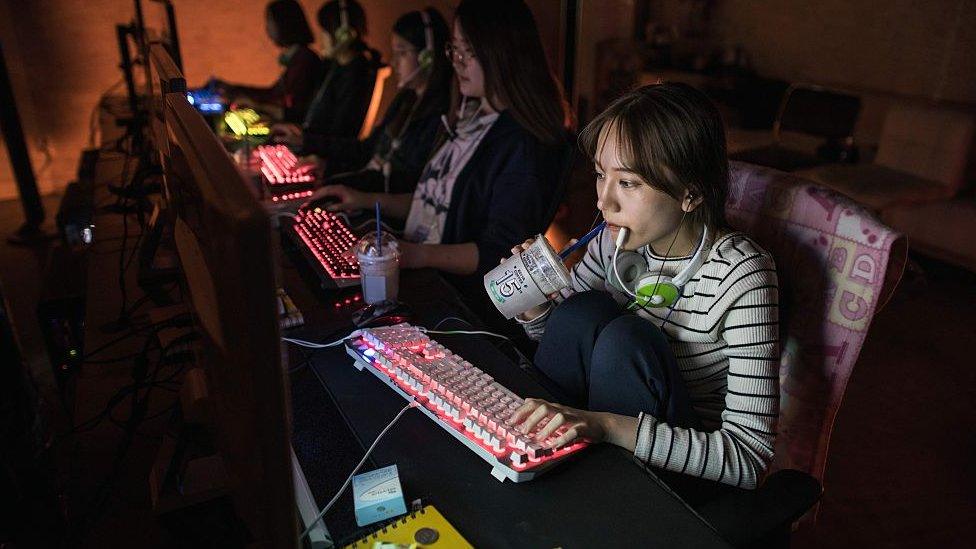
Women still remain a minority in South Korea's gaming industry
In another incident, a Korean version of Maxim magazine featured a staged picture on the cover of a man smoking coolly, leaning against his flash car with a lifeless woman, her heels bound, in the boot behind him like a victim of sexual crime.
Earlier this year, a woman was murdered in a random attack in a public toilet. The male attacker had been lying in wait in the toilet, waiting for a woman to come along.
After the murder, feminists demonstrated at the scene against anti-female violence - but some men also counter-demonstrated.
Over-sexualisation
Within the feminist movement, there is debate - often fierce debate - about tactics.
Megalia is radical but even within its ranks there is a feeling that it may go too far, over, for example, whether to out gay men who marry women as a cover for their homosexuality.
On other matters, there is less disagreement. South Korean feminist groups are unanimous in criticising the entertainment industry for what they say is the over-sexualisation of young girls (lolitafication), particularly in K-Pop groups.
Megalia is one of the feminist groups confronting what its members say is hypocrisy. For example, the group highlights, very publicly, the practice of some Korean men having affairs with prostitutes while on business trips abroad.
This controversy is given added zing in the online gaming industry which, in many parts of the world, has been accused of being dominated by males who sometimes seem anti-women.
In the United States, there have been allegations that gaming is played sometimes by men who exhibit a deep and aggressive sexism.
That sexism, Megalia activist Alex Song says, feeds off images of "sexually exaggerated" women on screen.
The thought that one of the characters in the Korean game "Closers" should be voiced (out-of-vision) by someone who might wear a T-shirt with a feminist slogan was just too much for some.
The company agreed. The actress' voice will not be heard in the game.
In the real world, though, silencing feminist voices is harder.
Update 13 September 2016: This story has been updated to include a later comment from Nexon.
- Published5 June 2015
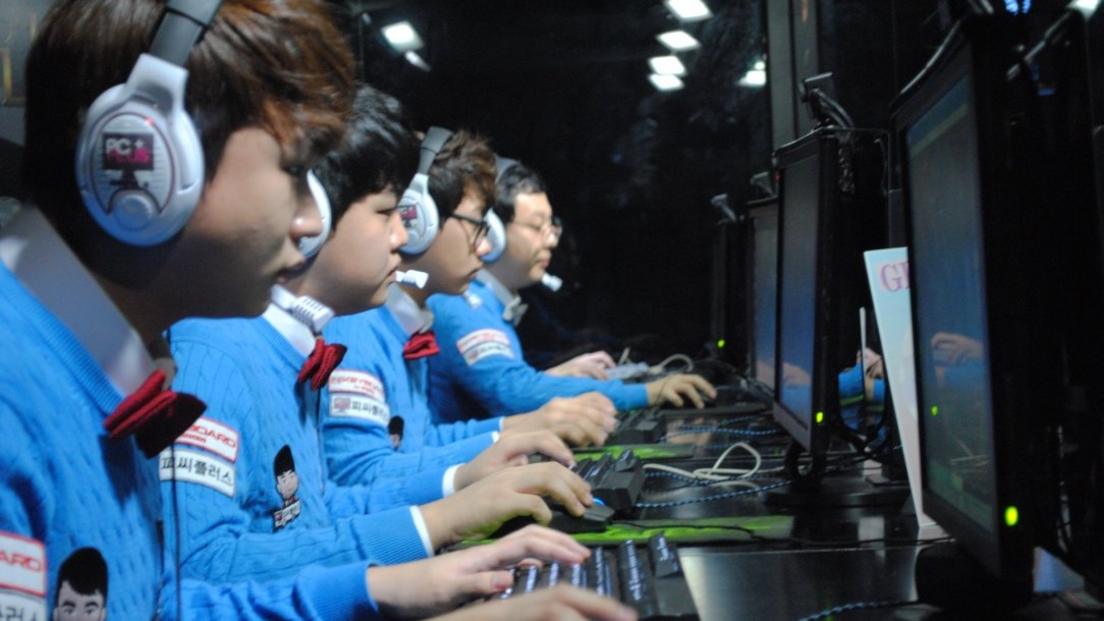
- Published6 March 2016

- Published9 December 2015
